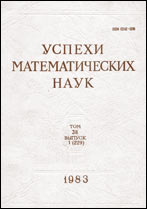|
This article is cited in 28 scientific papers (total in 29 papers)
An analogue of Saint-Venant's principle and the uniqueness of solutions of boundary value problems for parabolic equations in unbounded domains
O. A. Oleinik, G. A. Iosif'yan
Abstract:
Tikhonov's paper “A uniqueness theorem for the equation of heat conduction” [1], published in 1935, has had a great influence on the development of the theory of partial differential equations. In this paper he proved a uniqueness theorem for the solution of the Cauchy problem for the equation of heat conduction in certain classes of functions of exponential growth, and constructed examples of solutions to show non-uniqueness in wider classes of functions. Much research has been devoted to problems arising from Tikhonov's paper, and to the subsequent generalization and development of his results (see [2]–[10], and elsewhere); this research forms a significant contribution to the theory of partial differential equations.
Here we study the question of the uniqueness of the solution of the Cauchy problem, of boundary value problems, and of a problem without initial conditions. We also study the asymptotic properties of solutions of second order parabolic equations, by using a method based on the derivation of a priori estimates for the solutions that are similar to Saint-Venant's principle in the theory of elasticity [11]. Another new approach, which allows us to investigate these questions for general parabolic systems with general boundary conditions, and to obtain an analogue of Tikhonov's theorem, is given in [8]–[10]. It uses the analyticity of solutions of certain auxiliary parabolic systems with respect to an additional independent variable.
Received: 30.08.1976
Citation:
O. A. Oleinik, G. A. Iosif'yan, “An analogue of Saint-Venant's principle and the uniqueness of solutions of boundary value problems for parabolic equations in unbounded domains”, Russian Math. Surveys, 31:6 (1976), 153–178
Linking options:
https://www.mathnet.ru/eng/rm4013https://doi.org/10.1070/RM1976v031n06ABEH001583 https://www.mathnet.ru/eng/rm/v31/i6/p142
|


| Statistics & downloads: |
| Abstract page: | 1100 | | Russian version PDF: | 307 | | English version PDF: | 89 | | References: | 105 | | First page: | 4 |
|




 Contact us:
Contact us: Terms of Use
Terms of Use
 Registration to the website
Registration to the website Logotypes
Logotypes








 Citation in format
Citation in format 
